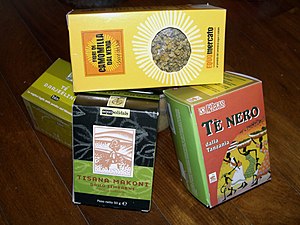 Image via WikipediaSocial sustainability has become the competitive frontier of the future. Propelled by the social conscience of British consumers concerning the welfare of those producing their food in developing countries, companies know that their customers expect them to project a responsible global image, in addition to providing good quality food at reasonable prices.
Image via WikipediaSocial sustainability has become the competitive frontier of the future. Propelled by the social conscience of British consumers concerning the welfare of those producing their food in developing countries, companies know that their customers expect them to project a responsible global image, in addition to providing good quality food at reasonable prices. The most contentious issue concerns child or forced labour. The majority of consumers in the UK believe that those companies selling food and groceries should be held entirely, or at least partly, responsible for insuring that no child is used in the production of food.
Insight into current issues both on the part of companies and shoppers has occurred largely through the efforts of Fair trade. “Ethically sourced” products are those that are promoted by Fair trade, which symbolise the payment of a fair price for any given product, determined by the economy of the country of origin. In addition, payment must be provided to the producer of the food before production begins.
Fifty-nine percent of all shoppers in the UK boast that they are active supporters of Fair trade, even if they only buy their products occasionally. More importantly, perhaps, is the fact that nine out of every ten shoppers claim they specifically choose stores that offer a wide selection of Fair trade products, and that those are the products they prefer to buy.
Marks and Spencer offers the perfect example of how retailers are ethically sourcing their many products. This corporation’s formidable behaviour is brave, responsible and ambitious and should serve as a model to others. By utilising Marks and Spencer Discount Codes and Marks and Spencer Discount Vouchers you are helping them enforce their five-year ethical strategy, which is directed at the fulfilment of Fair trade commitments and known as Plan A.
This concerns organic cotton ranges, which are meant to not only increase the use of organic fibres but also to improve the health of cotton-pickers. Some other aspects of the Marks and Spencer Plan A strategy include the ultimate goal of becoming carbon neutral by the year 2012, the establishment of the first 100% free-range egg supermarket and the very first company to phase out battery eggs and all intensively farmed poultry. All pork is also expected to be free-range within the next five years as well.
According to Citigroup: “…This was the most positive campaign the business has ever run, and measured on brand perception… By challenging consumers to look behind the label, M&S has increased pressure on its competitors to demonstrate their own efforts…We believe the company’s efforts to inform consumers on key topics of ethical procurement and production are contributing to the ongoing sales recovery and will underpin the brand’s performance going forward.”
It is up to all of us to do our part to improve the health and wellbeing of the workers who help to produce the food that is so vital to our daily survival.

No comments:
Post a Comment